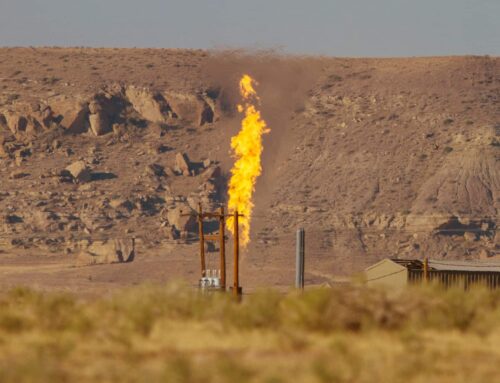We interrupt the looming gloom of the impending government shutdown to share a glimmer of good news.
Taxpayers are about to get more in return for oil and gas extracted from federal lands. At least they should.
Here’s the story:
The United States is home to a wealth of natural resources, including a vast mineral estate. Many of these valuable resources are collectively owned by the taxpayer, you and I. Tasked with overseeing these resources, federal agencies lease land to private entities to extract, develop, and sell federal oil and gas resources. Unfortunately, the system under which our federal lands are managed is, by the government’s own admission, woefully inadequate for leasing in the 21st century.
This week, the comment period ends on a new Dept. of the Interior rule that aims to change that.
And it couldn’t come a day too soon. TCS has long called for reforms to the federal oil and gas leasing system, and while some recent changes have improved the situation, more must be done to ensure a fair return for taxpayers.
For most of the last century, the federal government has allowed the oil and gas industry to profit from the sale of taxpayer-owned resources without adequately compensating taxpayers. To develop federal oil and gas, private companies must first pay a bid at public auction to secure a lease. Companies are then charged a royalty rate on any oil and gas produced and a rental fee on land not currently producing. Until last year, these fees were outdated and well below the market rate; the federal government charged a 12.5% royalty, a rental rate of $1.50/acre or $2/acre, and a minimum bid of $2/acre.
Last summer, Congress took a huge step towards bringing the leasing system into the 21st century by updating many of the fiscal terms – including the royalty rate, rental fees, and minimum bid – through the Inflation Reduction Act (IRA). Congress also eliminated the practice of noncompetitive leasing – a loophole that allowed entities to lease federal lands outside of auction and without paying a bid. These updates are crucial, but significant gaps remain.
Under the current system, taxpayers are saddled with cleanup liabilities left behind by the oil and gas companies because of outdated bonding rates. Companies are required to post a bond to ensure there is enough money for well sites to be properly restored after they are done drilling. Wells that are not properly reclaimed can damage the environment and pose serious health and safety threats to nearby communities, including methane leaks and contaminated groundwater. Low minimum bond requirements essentially incentivize companies to abandon wells after production, as it is often cheaper for a company to forfeit their bonds rather than clean up their wells.
As it stands, companies are only required to post a $10,000 bond for all wells on an individual lease, $25,000 for all wells in a single state, and $150,000 for all wells nationwide. Current bonds fail to cover the average cost of cleaning up even a single well, which can be anywhere between $35,000 to $200,000. When companies skip town or go bust without cleaning up their wells, taxpayers are left with the bill. Without adequate bonds, companies will continue to saddle taxpayers with further environmental and economic liabilities.
Thankfully the new proposed rule would codify reforms made under the IRA and tackle oil and gas bonding rates which didn’t make it into last summer’s reforms.
The proposed rule would increase the minimum required bond amount to $150,000 and $500,000 for individual and state wells, respectively, and eliminate egregious nationwide bonds. It would also direct oil and gas development towards locations with high production potential and away from important and sensitive wildlife habitat or cultural sites. Directing oil and gas leases toward appropriate locations can help ensure taxpayers get the best use out of public lands we all own.
TCS will be voicing our support for these important reforms in formal comments submitted to the Dept. of Interior this week. We’ll be urging a higher future royalty rate, and that the Bureau of Land Management (BLM) prioritizes taxpayer protections and a fair return for use of resources we all own. We’ll also be encouraging speedy adoption. We shouldn’t have to wait any more. It’s only been 100 years in the making.
Okay, now we’re back to staring down a shutdown in little more than a week.










